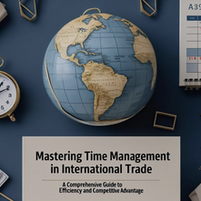Case Study 4: The Consequences of Selecting the Wrong Incoterms
- Mutlu AKGÜN
- Jan 19, 2025
- 3 min read
Updated: Jan 27, 2025

Background
Company Profile:
Company Name: Global Widgets Inc.
Industry: Manufacturing and Exporting of Widgets
Location: United States
Export Market: Europe
Scenario:Global Widgets Inc. received an order from a European distributor for a large shipment of widgets. In an effort to streamline the shipping process and minimize costs, the sales team selected Ex Works (EXW) as the Incoterm for the transaction without consulting the logistics department.
Selection of Ex Works (EXW)
Why EXW was Chosen:
Perceived Cost Savings: The sales team believed that selecting EXW would reduce costs for the company, as the buyer would handle all transportation and logistics.
Simplicity in Responsibilities: They assumed that transferring most responsibilities to the buyer would simplify the company's role in the transaction.
Consequences of the Wrong Choice
Lack of Logistics Knowledge:
The European distributor was inexperienced in international shipping and logistics. Under EXW, they were responsible for arranging pickup, export clearance, and transport to their location.
The distributor faced significant delays in scheduling transportation and customs clearance due to their lack of knowledge and resources.
Increased Costs for the Buyer:
The distributor incurred higher-than-expected costs for freight and customs, as they had to hire local logistics providers unfamiliar with the widget shipment.
These unexpected costs strained the relationship between Global Widgets Inc. and the distributor, as the distributor felt burdened by the financial implications of the EXW terms.
Damaged Reputation:
The delay in delivery resulted in missed deadlines for the distributor, leading to complaints from their customers.
The distributor’s reputation suffered, causing them to reconsider their partnership with Global Widgets Inc., potentially jeopardizing future orders.
Loss of Control Over Shipping:
Global Widgets Inc. had no control over the shipment process, including the timing and handling of the goods.
The company faced additional pressure to resolve issues arising from the logistics mismanagement, leading to increased operational strain.
Legal and Compliance Risks:
Since the responsibility for export documentation and compliance was on the distributor, there were risks of non-compliance with export regulations.
This could potentially expose Global Widgets Inc. to legal liabilities if the shipment were to be delayed or rejected at customs due to paperwork issues.
Lessons Learned
Involve Relevant Departments:
The sales team learned the importance of involving the logistics and compliance departments in the decision-making process for selecting Incoterms.
Understanding Buyer Capabilities:
Global Widgets Inc. recognized the necessity of evaluating the buyer's capabilities and experience in handling international shipments when selecting an Incoterm.
Education on Incoterms:
The company initiated training for its sales team to ensure they understood the implications of various Incoterms and could make informed decisions in the future.
Choosing More Suitable Incoterms:
The company decided to utilize CIF (Cost, Insurance, and Freight) for future shipments to Europe, as it allowed them to maintain control over logistics while providing the distributor with a clearer cost structure and reducing risks associated with the buyer's inexperience.
Building Stronger Relationships:
By ensuring a better understanding of shipping terms and responsibilities, Global Widgets Inc. aimed to foster stronger relationships with their international partners, thus enhancing their reputation in global markets.
Conclusion
The case of Global Widgets Inc. serves as a cautionary tale about the critical importance of selecting the appropriate Incoterms in international trade. Choosing the wrong Incoterm can lead to significant operational, financial, and reputational consequences. By involving all relevant departments and considering the capabilities of their partners, businesses can make more informed decisions that enhance their efficiency and relationships in the global marketplace.



















Comments